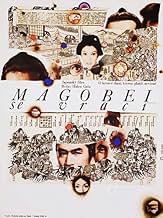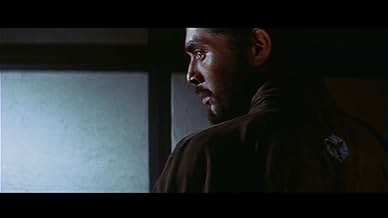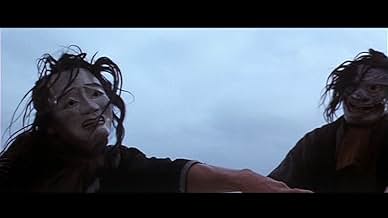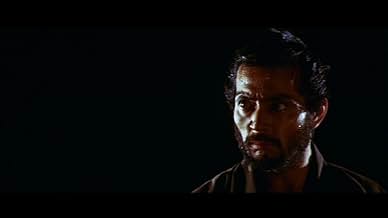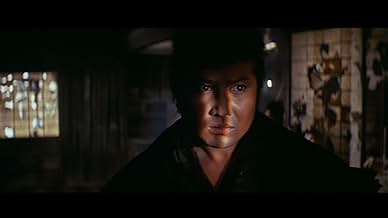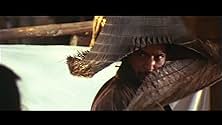CALIFICACIÓN DE IMDb
7.6/10
2.8 k
TU CALIFICACIÓN
Agrega una trama en tu idiomaA guilt-haunted samurai warrior attempts to prevent a massacre from taking place.A guilt-haunted samurai warrior attempts to prevent a massacre from taking place.A guilt-haunted samurai warrior attempts to prevent a massacre from taking place.
- Premios
- 2 premios ganados y 1 nominación en total
- Dirección
- Guionistas
- Todo el elenco y el equipo
- Producción, taquilla y más en IMDbPro
Opiniones destacadas
Goyokin is a hauntingly beautiful story of a Magobei Wakazaka a samurai turned to a drunk guilt ridden ronin after taking part in the slaughter of some innocent people because he was following orders from his brother in law in a plot to steal some official gold (Goyokin). When his brother in law decides to steal more gold and kill more people some assassins come for Magobei to silence him forever. This causes Magobei to throw down the bottle of sake and take up the sword once again. He decides to journey back to stop the slaughter and seek redemption.Gosha tells the classic story of a samurai and his giri-ninjo conflict, that is his struggle against following orders which is the way of the samurai, or doing what he believes is right. He uses his trademark crows as symbolic supernatural supervisors of karma and in such a way it eerily beautiful and unforgettable.
A remorseful samurai struggles to reconcile clan loyalty with honourable behaviour after turning a blind eye to the massacre of innocent villagers to cover up the theft of gold intended for the Tokugawa shogunate. Thematically similar to director Hideo Gosha's other chanbara, this film takes a hard look at the unquestioning obedience demanded of underlings in feudal societies and how the honour and fidelity can be manipulated to dishonorable and wicked ends. The three leads, Tatsuya Nakadai, Kinnosuke Nakamura, and Tetsuro Tamba, all well-established actors in Japanese cinema (both in jidaigeki and other genres), are excellent. The cinematography, which includes some fanciful imagery is great, the story interesting, and the 'action sequences' well-done and entertaining. All in all, a great entry in the popular genre from a top Japanese director.
Goyokin is one of those movies that I wanna scream from the rooftops just how incredibly awesome they are. The kind of film I wanna grab every person I know by the neck and force them to watch it with eyes wide open, Clockwork Orange style. It's really a cinematic crime that Goyokin is not as widely seen and regarded as the works of more famous Japanese directors, like Kurosawa. It might be a genre movie and as such attract mostly chambara fans, but this really deserves to reach more mainstream audiences. Put simply, if you like beautiful movies, you have to see this one.
The plot concerns a clan that is struggling financially who schemes to steal a shipment of the Shogun's gold and silence the nearby villagers who witness the crime and the ronin Magobei (played by the unparalleled Tatsuya Nakadai) who makes a moral stand and decides to go against his former clan. I won't go too far into plot details, but let's just say Goyokin is an anti-samurai film at heart. Like the best work of that other great jidai-geki director, Masai Kobayashi, Hideo Gosha doesn't try to pass moral judgement on his characters and treats them with compassion and affection. We're in 1830 and these are hard times for samurais as Japan finds herself on the brink of change. As one character realises in the end, "We sit here and die in the cold, and what does the Shogunate do? They get fatter in the heat". Gosha doesn't condemn the samurais for their soon to be obsolete code, rather puts things into perspective and shows us that desperate people will do desperate things. Innocent people die but who is really responsible for these crimes? It plays out like a good ancient Greek tradegy, minus the melodrama. Every emotion is incredibly nuanced here, every glance, move and frame. Gosha wisely lets the visuals tell the story.
And that brings me to the next point. The visuals. I am not exaggerating when I say that Goyokin is one of the most beautiful movies ever conceived. Yes better than most Kurosawa films, if the comparison has any merit. The colours are like small strokes of a brush on a white canvas as most of the film was shot outdoors in snowy landscapes. The rugged terrain is a pivotal character here, from the stormy sea to the blizzards to the open vistas. The cinematography and the way Gosha treats the locations as an integral part of every scene, reminded me of the spaghetti westerns of the great Sergio Corbucci (Django, The Great Silence). The muddy streets of a small town (as in Django). The snow blizzards and the cold, hostile terrain (as in The Great Silence). Samurais trying to prevent frostbite from setting in before a duel, unable to pick up their swords and fight. That nature is so tightly interwoven to the plot is another testament to Gosha's attention to detail. His cinematography is truly outstanding. I simply can't stress how visually awe-inspiring this movie is. Every frame is a painting. In a way it brought to mind the maestro Sergio Leone. After all the jidai-geki and the spaghetti western are very similar in the ways they depict their scarred heroes, the duel and the terrain.
I don't know what else to say about Goyokin. The performances are great all around with Ruriko Asaoka stealing every scene she's in, not least thanks to her drop dead gorgeous looks. Tatsuya Nakadai is once again outstanding in the lead role. The swordplay is fantastic, quick and brutal thrusts of the sword with an emphasis on the ritualistic aspect of the duel. The silence before and after. Although not as bloody and action-oriented as something like Lone Wolf and Cub, Goyokin left me more than satisfied in that department.
There's not much else to add, except that Goyokin is criminally underseen (judging by the amount of votes here). Maybe in the years to come western audiences will open up their horizons and realize what they've been missing. In the meantime if you're reading this, seek this movie out. You won't regret it.
The plot concerns a clan that is struggling financially who schemes to steal a shipment of the Shogun's gold and silence the nearby villagers who witness the crime and the ronin Magobei (played by the unparalleled Tatsuya Nakadai) who makes a moral stand and decides to go against his former clan. I won't go too far into plot details, but let's just say Goyokin is an anti-samurai film at heart. Like the best work of that other great jidai-geki director, Masai Kobayashi, Hideo Gosha doesn't try to pass moral judgement on his characters and treats them with compassion and affection. We're in 1830 and these are hard times for samurais as Japan finds herself on the brink of change. As one character realises in the end, "We sit here and die in the cold, and what does the Shogunate do? They get fatter in the heat". Gosha doesn't condemn the samurais for their soon to be obsolete code, rather puts things into perspective and shows us that desperate people will do desperate things. Innocent people die but who is really responsible for these crimes? It plays out like a good ancient Greek tradegy, minus the melodrama. Every emotion is incredibly nuanced here, every glance, move and frame. Gosha wisely lets the visuals tell the story.
And that brings me to the next point. The visuals. I am not exaggerating when I say that Goyokin is one of the most beautiful movies ever conceived. Yes better than most Kurosawa films, if the comparison has any merit. The colours are like small strokes of a brush on a white canvas as most of the film was shot outdoors in snowy landscapes. The rugged terrain is a pivotal character here, from the stormy sea to the blizzards to the open vistas. The cinematography and the way Gosha treats the locations as an integral part of every scene, reminded me of the spaghetti westerns of the great Sergio Corbucci (Django, The Great Silence). The muddy streets of a small town (as in Django). The snow blizzards and the cold, hostile terrain (as in The Great Silence). Samurais trying to prevent frostbite from setting in before a duel, unable to pick up their swords and fight. That nature is so tightly interwoven to the plot is another testament to Gosha's attention to detail. His cinematography is truly outstanding. I simply can't stress how visually awe-inspiring this movie is. Every frame is a painting. In a way it brought to mind the maestro Sergio Leone. After all the jidai-geki and the spaghetti western are very similar in the ways they depict their scarred heroes, the duel and the terrain.
I don't know what else to say about Goyokin. The performances are great all around with Ruriko Asaoka stealing every scene she's in, not least thanks to her drop dead gorgeous looks. Tatsuya Nakadai is once again outstanding in the lead role. The swordplay is fantastic, quick and brutal thrusts of the sword with an emphasis on the ritualistic aspect of the duel. The silence before and after. Although not as bloody and action-oriented as something like Lone Wolf and Cub, Goyokin left me more than satisfied in that department.
There's not much else to add, except that Goyokin is criminally underseen (judging by the amount of votes here). Maybe in the years to come western audiences will open up their horizons and realize what they've been missing. In the meantime if you're reading this, seek this movie out. You won't regret it.
From the truly creepy opening to the climax, this movie holds your attention, both with its cinematography and (more preciously) a gripping and coherent storyline.
Excellent filming techniques in this film hold your attention, when the suspense (yes! actual suspense!) doesn't. The acting (by Nakadai Tatsuya, one of Japan's greatest actors -- far better than Mifune Toshiro, IMHO) is top notch. Finally, the violence (though there's plenty) never degenerates into splatter. The violence appears much more disturbing (intentionally so) and much less titillating than in many "chambara" movies.
Also noteworthy, this movie plays on the "loyalty vs. morality" theme that Gosha seems so fond of hammering. In this particular movie, however, he really pulls it off with some intelligence. Though I'm a big fan of Gosha, I have to admit that not everything he touches turns to "gold" (Get it? You will...).
Even so, if you're going to sample from the "chambara" genre, this is among the best (my other nominee would be "Hitokiri/Tenchu" (1969). Frankly, I think it's among the best Japanese films, period.
Excellent filming techniques in this film hold your attention, when the suspense (yes! actual suspense!) doesn't. The acting (by Nakadai Tatsuya, one of Japan's greatest actors -- far better than Mifune Toshiro, IMHO) is top notch. Finally, the violence (though there's plenty) never degenerates into splatter. The violence appears much more disturbing (intentionally so) and much less titillating than in many "chambara" movies.
Also noteworthy, this movie plays on the "loyalty vs. morality" theme that Gosha seems so fond of hammering. In this particular movie, however, he really pulls it off with some intelligence. Though I'm a big fan of Gosha, I have to admit that not everything he touches turns to "gold" (Get it? You will...).
Even so, if you're going to sample from the "chambara" genre, this is among the best (my other nominee would be "Hitokiri/Tenchu" (1969). Frankly, I think it's among the best Japanese films, period.
I saw "Goyokin" in 1969 at a small theater in Yokohama, Japan. It was in Japanese, of course, but the evolution of the story was understood. The film was so well done, and beyond what I was used to as an American watching Japanese movies in Japan. The acting was superb and the tension was palpable. The story was unique and its presentation was gorgeous. It's not hyperbole to say I was awestruck. With the advent of VHS I began searching for this movie as a video. After years of searching, I bought a barely watchable re-re-re-reprint with multiple subtitles. I was happy to HEAR the movie again! Tom ("Billy Jack") Loughlin made the putrid, displaced "The Master Gunfighter" but it was ludicrous as a Western. I will never understand why this classic has not been produced as a Video! Obviously, many people know about it, and it appears on wish lists throughout the world. It deserves the full DVD treatment and, PLEASE, while the great Tatsuya Nakadai is still alive to provide commentary on it.
¿Sabías que…?
- TriviaThis is the first Japanese feature film in Panavision.
- ConexionesFeatured in Trailer Trauma V: 70s Action Attack! (2020)
Selecciones populares
Inicia sesión para calificar y agrega a la lista de videos para obtener recomendaciones personalizadas
- How long is The Steel Edge of Revenge?Con tecnología de Alexa
Detalles
- Tiempo de ejecución
- 2h 4min(124 min)
- Mezcla de sonido
- Relación de aspecto
- 2.35 : 1
Contribuir a esta página
Sugiere una edición o agrega el contenido que falta

